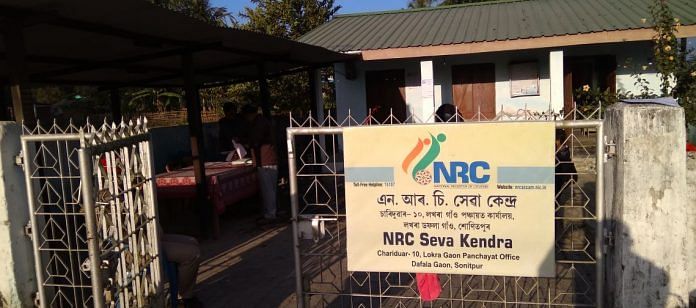Rural housing and job schemes badly hit since block-level officials have been busy with the exercise that has to be completed by 30 June 2018.
New Delhi: As the process of updating the National Register for Citizens (NRC) continues in Assam, implementation of key schemes in the state’s rural areas is suffering with block-level officials busy with this mammoth exercise.
The process of updating the NRC, with 1971 as the cut-off year, is aimed at identifying illegal Bangladeshi immigrants, and eventually evicting them.
The Supreme Court has directed the government to complete the whole process by 30 June 2018, including disposing of claims and objections.
Although the authorities concerned seem confident about publishing the complete draft list by then, they say the time taken for the final list is a “grey area” since it would depend on the number of applications for claims and objections.
The most tedious task in the process of updating NRC — verification — started in September 2015.
Rural schemes take a back seat
This long-drawn, time-consuming process has, however, meant that the execution of important rural schemes is suffering since ground-level officials have been busy with the exercise. According to senior officials in the ministry of rural development, it is the Pradhan Mantri Awaas Yojana-Grameen — the rural housing scheme — whose implementation has been particularly poor.
In the financial year 2016-17, only 8.24 per cent of the total houses sanctioned were completed in Assam, as against a national average of 52.6 per cent. The figures for this year are even more dismal. Only 83 of the 17,099 houses sanctioned in Assam have been completed. This is a poor 0.48 per cent, while the national figure stands at 34 per cent.
In the Mahatma Gandhi National Rural Employment Guarantee Act (MGNREGA), the person-days generated in 2016-17 went down from 486.33 crore the previous fiscal to 466.81 crore, and has declined further this year to 453.38 crore (figure only to date). The total number of households that got 100 days of work has also seen a decline — from 42,233 in 2015-16 to 11,422 in 2016-17 and 9,301 this fiscal.
Gigantic exercise
“It wouldn’t be right for me to comment on this (the delay in implementation of rural projects). But yes, NRC is a once in a lifetime exercise. The court had said it should get topmost priority and the officials deployed for this should not be deployed for other purposes,” NRC state coordinator Prateek Hajela told ThePrint.
“It is a gigantic exercise which requires a lot of time and energy from officials concerned,” Hajela added.
The update of the NRC involves multiple steps — inviting applications, receiving applications, verification, publication of the first draft, publication of complete draft, receipt and disposal of claims and objections and finally, the publication of the final list. The first part of the draft NRC, published on 31 December last year, had names of about 1.90 crore people out of a total of 3.29 crore applicants.
Work is now on to verify the remaining names and come out with the complete draft, before receiving objections, addressing them and publishing the final list.
“We have given a complete action plan to the Supreme Court according to which we can publish the complete draft by 30 June,” Hajela said.
“Claims and objections have to be invited. People will have to be given one month for submitting their claims, objections. It is difficult to say how long it will take to dispose them off, that is a grey area,” he said.
The NRC, first published after the 1951 Census, is now being updated under Supreme Court’s monitoring. The next SC hearing is on 27 March.
Applicants have to submit documents to prove that their names appeared in the NRC of 1951, or in any of the electoral rolls of Assam until 1971, or in any of 12 other documents issued before 1971.




Very difficult to visualise how this exercise will actually end.